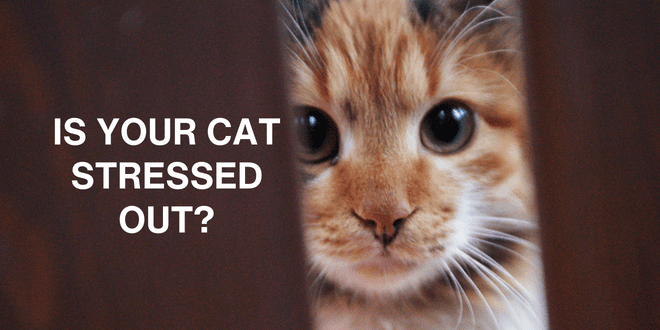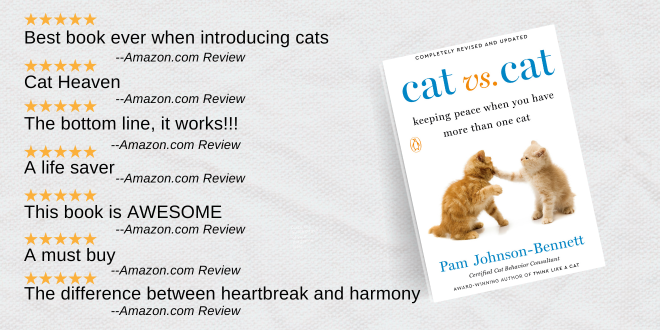Listen to the audio version of this article

When I talk to some people about how stress affects their cats, I sometimes get very strange looks. Back in 1982 when I first started my cat behavior consulting business, the idea of stress in cats was pretty much unheard of. I even remember being laughed at when my first book came out in 1990. Cats experiencing stress? What nonsense! These days, the veterinary world is doing more and more to educate clients about stress in cats and veterinarians work hard to minimize stress in the clinic setting. For some cat parents though, even with more information available about how stress affects cats, the idea their pampered pet could have anything to feel stressed about is a ridiculous one. Is it really ridiculous? Absolutely not. All animals are capable of being stressed and it can be potentially dangerous so it’s important to learn the signs and evaluate your cat’s situation to see if there’s anything that can be done to keep stress levels to a minimum.
Understanding Cat Stress
No one, not even your cat can escape a certain amount of stress in life. In fact, some stress is necessary for survival. If your cat perceives an immediate threat, it’s the acute stress response that triggers the release of hormones responsible for the fight or flight response. The fear from the impending threat and the stress response it triggers is what prepares the cat to fight it out or get the heck out of there. This acute stress response is short-lived and once the threat is over, the cat’s physiological systems return to normal.
Cat parents are more likely to recognize when their cats are experiencing acute stress. The cat’s body language is not at all subtle. The cat’s ears may be laid back flat, the pupils dilated, the body may be in a crouched position and vocalization may include growling. Just think about how most cats tend to look when they’re sitting on the examination table at the veterinarian’s office or when one outdoor cat comes face-to-face with another unfamiliar cat.
Chronic Stress in Cats
This is the type of stress that’s more subtle and easily missed by some cat parents. Chronic stress occurs when the cat is left in a state of uncertainty. Think of a cat forced to live every day with another cat who displays constant hostility, or a cat living in an environment where the litter box conditions are dirty and unappealing. What about the cat confined to a cage in a shelter for months? Can you imagine the degree of chronic stress there? Or what about the indoor/outdoor cat who has moved to a new neighborhood and is put outside every day with no safe retreat back to the security of his home? These are just a couple of examples but there are so many other situations that could create stress. It’s important to look at your cat’s world from his point of view – use your think like a cat skills in order to see what might be the stress culprit. Pay attention to your cat’s movements and behavior. Your cat is a marvelous communicator. His behavior patterns and body language are providing volumes of information. The problem is that many times, we’re too busy to notice or we fall into the pattern of assuming cats are low maintenance so we brush off those behavior changes.
The cat’s body is equipped to handle short-term stress but it’s the chronic, long-term stress that can play a big role in the development of behavior problems and even disease. The body wasn’t designed to handle ongoing, relentless stress.
Signs of chronic stress can be very easy for cat parents to miss. The cat may start hiding more often or might have a decrease in appetite. Maybe the cat has started being inconsistent in using the litter box. Because most of the behaviors happen slowly over time, they can be easily overlooked or attributed to something else.
Do Some Cats Handle Stress Better Than Others?
The answer is yes. There’s a genetic component to how well your cat may be handling stress. How she was socialized will also play a significant role. A cat who was exposed to different stimuli (sights, sounds, people, etc) as a kitten, will probably stand a better chance of coping with stress over the cat who didn’t receive adequate socialization. How stressed the queen was can also affect how stressed the kittens may be. The other big factor is the environment and this is the one element where I find many people miss the signs. A person may bring a cat indoors and provide complete safety and the best health care but not realize that neglecting to provide environmental enrichment for that cat may actually be creating stress. Or maybe the cat parent is unaware that the noisy, chaotic home environment is frightening to the cat and on a day-to-day level, it’s contributing to continued stress. Even the most loving cat parent may be unaware inappropriate attempts at insistent interaction with the newly acquired frightened shelter cat may appear threatening. With no relief from the forced physical contact, the cat becomes chronically stressed.

How Do You Help a Stressed-Out Cat?
The first step is to figure out the stress trigger. You can provide a loving, warm, wonderful home for your cat but if he feels as if he’s living in hostile territory because your other cat is relentlessly ambushing him, then that environment, not matter how cushy, is stressful. Look at your cat’s environment through his eyes. Imagine how it would be if you felt as if your home wasn’t safe for you. Imagine having to worry about being attacked or ambushed every time you walked into the kitchen or bathroom. How stressed would you be if someone bullied you during meals and frightened you so you had to sneak into the kitchen to eat when no one was around? Or what if you were forced to use a bathroom day after day that was filthy? Look at your world from your cat’s point of view and you’ll be surprised how many stress triggers you’ll see – many of which can be modified and eliminated. No, you won’t be able to take away all of your cat’s stress but if you start looking at life through the eyes of your cat, you’ll discover many little (and some big) adjustments you can make that will create a huge difference.
Here are some suggestions to help you get started on helping your cat:
- Help your cat get comfortable with the cat carrier so car travel won’t be so frightening
- Take your cat to a veterinary clinic that has worked to create a cat-friendly practice
- Address multicat tension issues now, before they get any worse
- Make sure there are adequate resources for each cat to reduce competition and guarding
- Maintain good litter box hygiene
- Create environmental enrichment in the home
- Socialize your cat
- Ease your cat through life transitions rather than make abrupt changes
- Maintain your cat’s veterinary care
- Engage your cat in daily interactive play sessions
- Do gradual, positive new pet introductions
- Provide good quality nutrition
Need More Information on Cat Stress?
The above information is just to give you an idea of what your cat needs. Each situation is unique. What’s most important is to look at your cat’s circumstances and figure out what might be causing the ongoing stress. In some cases all that will be needed are some minor tweaks to help him feel more secure. In other cases, the ongoing stress response is causing harm to him emotionally and physically.
For more information on how to create a healthy, happy environment for your cat or if you’re dealing with behavior problems, refer to the books by best-selling author Pam Johnson-Bennett. Pam’s books are available at bookstores and online. We’ve included links to Amazon here on our website.
If you need professional help, ask your veterinarian for a referral to a veterinary behaviorist or certified cat behavior consultant.
If you have a question regarding your cat’s health, please contact your veterinarian. This article is not intended as a replacement for your cat’s veterinary care.




